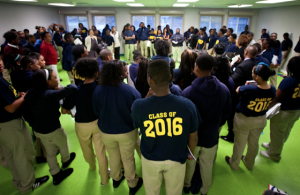 Morning circle session for 9th graders at Plymouth Education Center in DetroitOn Tuesday, Melinda Clynes wrote an article in Model D, "a web-based magazine creating new narratives for Detroit since 2005," titled "City kids: How proactive restorative practices benefit all." Framing the argument for restorative practices in terms of the failures of No Child Left Behind, Clynes writes:
Morning circle session for 9th graders at Plymouth Education Center in DetroitOn Tuesday, Melinda Clynes wrote an article in Model D, "a web-based magazine creating new narratives for Detroit since 2005," titled "City kids: How proactive restorative practices benefit all." Framing the argument for restorative practices in terms of the failures of No Child Left Behind, Clynes writes:
While national education leaders try to repair the wrongs of public education, plotting their post No Child Left Behind moves, here in Detroit, some folks tout that school reform might better begin with developing and nurturing relationships among students, between students and teachers, and between schools and community.
Enter a concept called Restorative Practices, a process used in schools (and elsewhere) to proactively build community and social coherence. When fully implemented, it involves everyone who spends their days within the school walls: students, food service staff, teachers, social workers, and principals. Together, they create a healthier environment for learning.
At Plymouth Educational Center in Detroit, a charter school district made up of a K-8 school, a 9th grade academy, and a 10th to 12th grade high school, Restorative Practices are being fully implemented to help students and teachers get along, set boundaries, and find support.
Here’s how it works.
According to the center’s Interim Superintendent Dr. Christopher Plum, opening "circles" start the morning; circles give students a platform to check in with their classmates and teachers, talk about what’s on their mind, and share how they are feeling. The small amount of time spent on creating tighter relationships has benefits; students not only celebrate personal achievements with their peers, but also talk openly about struggles at home or elsewhere with support from their classmates and teacher.
The idea is this: with distractions aired and out of the way, students can better focus on learning. Teachers know what’s going on with their students, and, that alone, can lead to a different outcome for troubled students. In a traditional setting, a student who is troubled might be kicked out of class for being aloof or disruptive. With Restorative Practices, that student may have already dumped some of their emotional baggage during the circle, and if she’s still feeling upset, the teacher has that background and can offer additional support.
Later in the article, Clynes retells some anecdotes she learned from IIRP licensee Henry McClendon's "book bag full of great stories about how Restorative Practices have turned individual lives, classrooms, and whole schools around."
Read the full piece: City kids: How proactive restorative practices benefit all.
